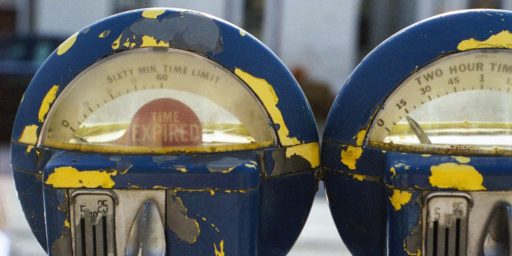Parking Costs
Tyler Cowen responds to a reader wondering why NYC parking garages set their rates such “that the first hour is very expensive ($10-ish), but staying for the whole day is only slightly more expensive (typically about double the one hour rate). Everywhere else in the country it’s pretty much a flat rate of $X/hour give or take a bit.” The crux of his response:
Maybe the tourists (i.e., New Jerseyites) are high demanders and bad searchers. They also park for only part of the day, either to see a museum or to attend a meeting. Charging a high upfront rate is a way to gouge these sorry souls. Commuters are more price sensitive, but they account for the bulk of the parking only in other American cities; furthermore since they park for the whole day they pay the same daily price no matter how skewed the rate for the first hour.
Presumably, too, most of the “costs” of allowing someone to park in one’s garage apply irrespective of the length of the stay, since the cashier and valet have the same amount of work to do regardless.
My experience with DC parking garages is similar, by the way; the first hour is always a very high fraction of the day rate. The only exception seems to be the local airports, which often give free or nominal priced parking the first 15 or 30 minutes for those just doing quick pickups and drop-offs.






Makes perfect market sense to me. While a few parkers may have the parking rates change their plans, most are going to park there as long as it takes to do what they came to do and then leave. So if the short timer leaves and they can sell the space again, great.
It may well be that the long term parkers cover the fixed costs and the short term parker make-up the bulk of the profit.
Markets probably have nothing to do with it. If New York is anything like Chicago, the rates and terms for parking garages in the city are probably set by the city.
Well it is basically a form of price discrimination, or what in economics is called a two-part tariff. A two-part tariff takes the form of T(q) = A + pq. A is your up front $10 fee and pq is the hourly fee. It is usually found with monopolists, but in this case the parking garages are probably more accurately described as monopolistic. That is, there is some competition, but since the product isn’t homogenous (i.e. some garages have more desirable locations/facilities/etc.) They have some price setting power.
Also, the cost argument by James explains part of it too. The fixed costs for running a parking lot are quite high, while I suspect the marginal costs are very low. Hence a price T(q) = pq may not recover all of the costs.
Parking garages have the equivalent in utilities. I pay a $10/mo. meter fee to the power company before I pay for each kilowatt of electricity I use. The more I use, the less per kilowatt hour it actually costs me. The more I use my phone, the less per call. In every part of our economy, the more you buy, the less cost per unit.
I have found the same kind of rate structure in every parking garage I have used. It costs more to park 6 cars in the same spot per day than to park 1 there. Like someone else said, the all day parkers pay the lions share of the expenses, while the short termers contribute most of the profit. That is just the way our economy works.
The reason other cities don’t do it is that it’s much easier to find a normal, metered spot.